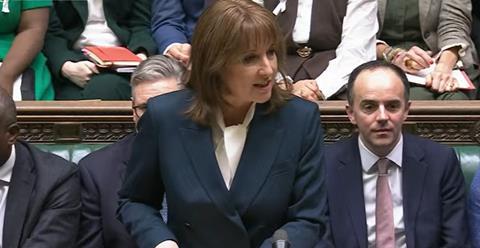National insurance freeze extended for three years and minimum wage increased
Construction firms are facing higher national insurance contributions but have been spared a costly landfill tax under measures announced by Rachel Reeves in today’s Autumn Budget.
The chancellor outlined plans to freeze national insurance and income tax thresholds for an extra three years from 2028 meaning more employees will be dragged into higher bands over time.

The legal minimum wage for over-21s will also rise by 4.1% in April, from £12.21 to £12.71 per hour, while the rate for 18 to 20-year-olds will go up by 8.5%, from £10 to £10.85 per hour under plans to establish a single rate for all adults.
Julie Palmer, partner at restructuring specialist Begbies Traynor, said: “What will be difficult to avoid is the impact on the smaller businesses in their supply chain, and while the impact of the tax increases and minimum wage rises will take longer to filter through, there could be rises in restructuring, refinance or exits in the pipeline. For the larger players in the market their main concern must be skills shortages and supply chain disruption from businesses collapsing, now and in the future.”
And Sean Keyes, the chief executive of Liverpool consultant Sutcliffe, warned: “Make no mistake, these costs don’t simply disappear into company accounts. After 40 years in this business, I can tell you exactly what happens: firms will have to make difficult choices about recruitment, pay rises will be constrained and some projects will need repricing.”
However, the Treasury said it would not proceed “at this time” with plans to converge the two rates of landfill tax, which charges builders for the removal of topsoil from construction sites, have been scrapped following a consultation held earlier this year.
Budget at a glance
- Freeze on national insurance thresholds extended for three years from 2028
- Legal minimum wage to rise in April by 4.1% for over 21s and by 8.5% for 18 to 20-year-olds
- Plans to converge two rates of landfill tax halted
- £13bn funding for seven regional mayoralties
- “Mansion tax” of between £2,500 and £7,500 for properties valued over £2m.
- Recommitment of £900m for Lower Thames Crossing
- Funding for regional infrastructure projects including £20m Peterborough sports quarter
- OBR upgrades growth forecast from 1% to 1.5% but downgrades productivity
- Fiscal headroom doubled to £22bn
- Recommendations to cut red tape in nuclear sector to be delivered within three months
There are currently two rates of landfill tax: the standard rate of £126.15 per tonne and the lower rate, which broadly applies to inert, less polluting materials, is £4.05 per tonne.
Reeves said in her address to Parliament that after “listening to representations, particularly from our house building industry,” she would no longer converge towards a single rate and prevent the gap between the two rates from widening.
In documents published after Reeves’ address, the Treasury said it had revised its approach to ensure the reforms to landfill tax are “proportionate, do not impose unavoidable costs on businesses and do not undermine the government’s target of building 1.5 million new homes in England”.
The government will also retain the tax exemption for backfilling quarries to “ensure that housebuilders and the construction sector continue to have access to a low-cost alternative to landfill”.
Meanwhile, plans to get more young people into work will see training for under 25 apprenticeships become free for small and medium sized businesses.
Reeves also committed to devolving £13bn in flexible funding for regional leaders to invest in skills, infrastructure and business support.
The funding will be provided via integrated settlements from 2026-27 to 2029-30 for seven Mayoral Strategic Authorities, Greater Manchester, West Midlands, Liverpool City Region, West Yorkshire, North East, South Yorkshire and the Greater London Authority, representing nearly 40% of people in England.
The Treasury said the scheme will “empower mayors with local control over a single flexible pot for growth and public services priorities, aligned with their local growth plans”.
More money will also be provided for regional projects including £20m for a sports quarter in Peterborough and £16m for a science centre in Darlington.
Reeves announced the establishment of the Leeds City Fund, a business rates retention zone in Leeds city centre within which Leeds City Council can retain 100% of business rates growth above an agreed baseline for 25 years.
The chancellor also recommitted funding for major infrastructure projects including £900m for the Lower Thames Crossing.
Today’s announcements came after the Office for Budget Responsibility accidentally published its economic forecast and details of the Budget on its website.
The OBR has apologised for the “technical error” and said it has launched an investigation into what happened.



























No comments yet